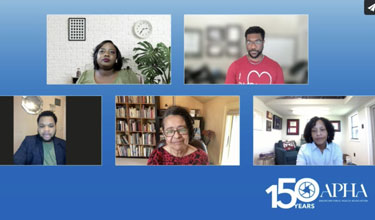APHA’s National Public Health Week events kicked off with momentum, with public health professionals and health supporters learning about racism, trust-building, careers in public health and more on the first days of the annual observance.
In conjunction with Monday’s focus on combating racism, APHA hosted a live panel of community leaders who showcased ways to create a strong foundation for healthy change. Racism continues to have a heavy impact on health in the U.S., said member Conrado Bárzaga, MD, chief executive officer at the Desert Healthcare District and Foundation, including the health of his own California community, which is divided by wealth.
“We live in a community with very profound disparities,” he told The Nation’s Health. “The air quality is terrible, and the water quality is as bad as the air quality. As a result of that, we have very poor health outcomes.”
Communities that experience health disparities have often been marginalized by systemic racism and immigration policies, Bárzaga said. Collaborating with community leaders to improve trust can help address those barriers. Bárzaga said that he built a coalition of local organizations in California’s Coachella Valley to address the inequities among Hispanic farmworkers.
“We recruited local community members that represented the farmworkers and the lower-income Spanish-speaking individuals,” he said. “They have been able to translate the needs, demands and opportunities...to deliver health care resources to them.”
Also on Monday, APHA's American Journal of Public Health hosted a discussion on the historic legacy of National Negro Health Week, which was the precursor to what became today’s National Public Health Week. Launched in 1915 by educator and author Booker T. Washington as National Health Improvement Week, the eight-day April event focused on health promotion.
“National Negro Health Week was in large part a response to the horrible health disparities in the early part of the twentieth century,” Phoebe Ann Pollitt, MA, MSN, PhD, a retired professor at Appalachian State University, told The Nation’s Health. “(Jim Crow) laws and customs also greatly limited the number of African Americans and other people of color practicing medicine, nursing, dentistry and other health care careers.”
That legacy continues to be felt today. A 2021 study found that the proportion of U.S. physicians who are Black increased by only 4 percentage points over the past 120 years, making up only 5.4% of physicians in 2018.
Former APHA president Caswell Evans, DDS, MPH, professor emeritus at the University of Illinois Chicago, spoke about how his experience as a Black man informed his wanting to bring public health work to Los Angeles and then across the country through APHA. The Association has been the official convener of National Public Health Week for more than 25 years, and as did National Negro Health Week, NPHW has subthemes focusing on a new topic each day.
On Tuesday, the focus of National Public Health Week shifted to the public health workforce and issues such as with burnout. Activities were held across the U.S., and APHA hosted two student-focused events on mentoring and young health professionals.
Mentoring took on a more important role during the COVID-19 pandemic, according to APHA Executive Board member Bryan O. Buckley, DrPH, MPH, a research fellow at Medstar Health's Institute for Quality and Safety who spoke during the APHA event. Students who were attending school, graduating and looking for jobs in an all-virtual format faced unexpected roadblocks.
“I think this is the moment that we need mentorship the most to help guide us through the uncertainty of what public health looks like in the future,” he told The Nation’s Health. “When you pay it forward, it actually helps pay it forward for somebody else.”
Buckley said he developed a decade-long relationship with his mentor and fellow panelist, APHA member Ngina Lythcott, DrPH, MSW, RN, a public health practitioner and health advocate, which benefited his professional growth.
Students can also gain valuable professional skills outside the classroom, according to Arianne Noorestani, a project communications support specialist at APHA, who also spoke on the panel.
“I joined a cultural student organization once I got to college and it was a life-changing experience for me,” Noorestani told The Nation’s Health. “The skills you gain from leadership roles in student organizations are incomparable to any internship you may have during undergrad…The comradery of working together with other students on a passion project is unlike anything I have ever experienced.”
As part of APHA Your Way, a project to enhance the APHA member experience, the Association is building a new mentorship program, scheduled to launch later this year.
To learn about the other NPHW activities hosted by APHA this week and events around the nation, visit the event website.
Photo: Clockwise from top left, speakers at Tuesday’s mentorship event included Tiara Scott, Bryan O. Buckley, Jennifer Perkins, Ngina Lythcott and Jean Dolin.